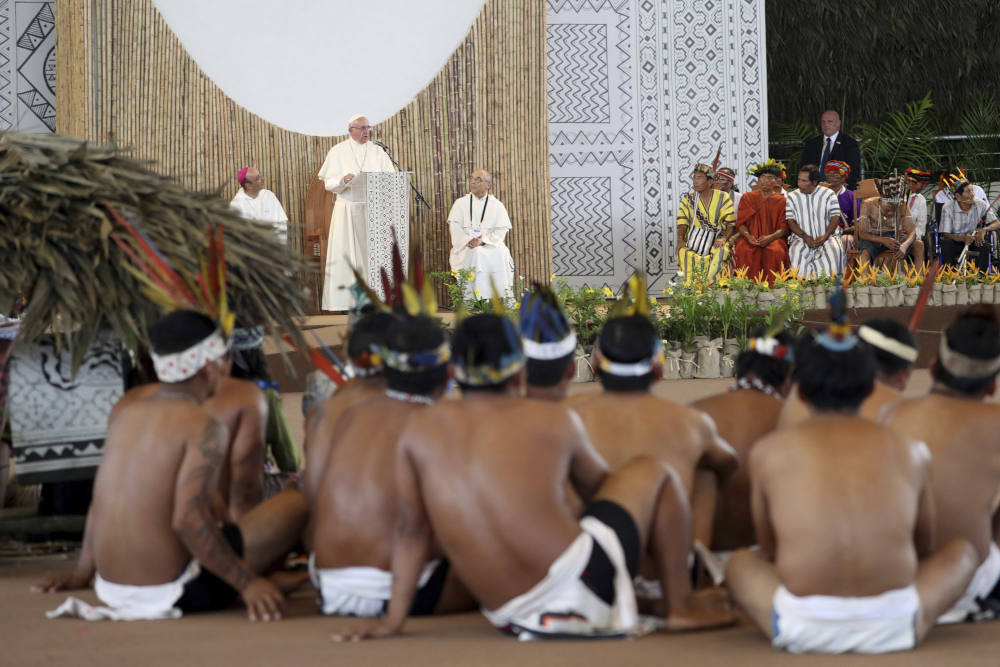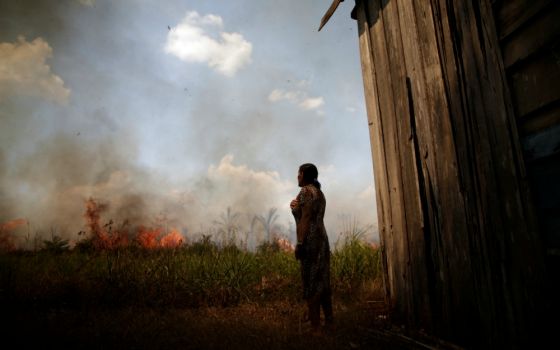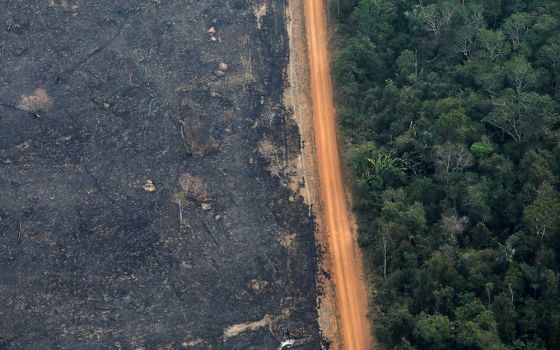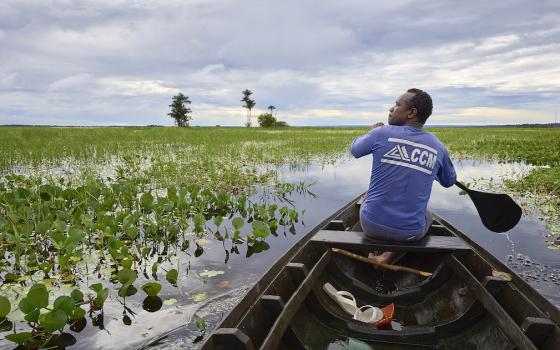
Pope Francis speaks to indigenous groups in Puerto Maldonado, Peru, on Jan. 19, 2018. Standing with thousands of indigenous Peruvians, Francis declared the Amazon the "heart of the church" and called for a three-fold defense of its life, land and cultures. (NCR/AP/Alessandra Tarantino)
Much has been made in Catholic circles about the working document for the synod of bishops scheduled for this fall, currently titled "The Amazon: New Paths for the Church and for Integral Ecology."
One of the most important critics of the agenda set out in the instrumentum laboris is German Cardinal Walter Brandmüller, who has flatly announced that it "contradicts the binding teaching of the Church in decisive points and thus has to be qualified as heretical."
That, as they say in the business, is a strong statement.
One might expect that Cardinal Brandmüller would focus his criticism on the possible exceptional measures suggested in the working document to ordain elderly, indigenous married men in remote areas of the Amazon so the faithful there could go to Mass. This is where most of the buzz in the unfolding debate has been focused, with traditionalists laying out the case that the ordination of married men, however exceptional, would be heretical in ways that the church’s current practices — admitting married Episcopal clergy as converts to Catholicism or married priests in the Eastern Catholic Churches — are not.
But this is not where Brandmüller and others in his camp have voiced concern. Disturbingly, their first target seems to be Catholic social doctrine.

Cardinal Walter Brandmüller. (RNS/Courtesy of the Vatican)
"Clearly," Brandmüller writes in a letter that LifesSite News published in full, "there is an encroaching interference here by a synod of bishops into the purely secular affairs of the Brazilian state and society. What do ecology, economy, and politics have to do with the mandate and mission of the Church? More importantly: what professional expertise authorizes an ecclesial synod of bishops to express itself on such topics?"
This may sound like a reasonable concern until it is put in the context of the Vatican’s true aims in the synod.
Put plainly, this synod will put the church on the side of the indigenous Amazon peoples. In particular, it will put the church on the side of an integral ecology that respects both God’s creation and its relationship with the flourishing of the indigenous Amazon peoples.
It will recognize, furthermore, that the church cannot be identified with the developed West alone and will honor the fact that, as Pope St. John Paul II insisted, Christ is present in indigenous peoples in a very special way.
Indeed, the working document insists that life in the Amazon is threatened by environmental destruction and exploitation and by the systematic violation of human rights. In particular, it is threatened by the violation of the rights of indigenous peoples, such as the right to territory, to self-determination, to the demarcation of territories and to prior consultation and consent.
According to the communities participating in the synod, the threat to life comes from global economic and political interests, especially resource-extractive companies, often in collusion with, or tolerated by, local and national governments as well as traditional indigenous leaders.
The Amazon has great riches — both in its people and its resources — that these forces have taken, are taking, and mean to take in the future. The synod’s working document turns its critical attention to "insatiable vision of unlimited growth, of the idolatry of money, of a world disconnected from its roots and environment, of a culture of death."
The developed economic and political powers, of course, will not go down without a fight. But it is incumbent on the Catholic Church to remain faithful to our social doctrine by insisting on our religious duty to be on the side of the indigenous peoples in this conflict.
Advertisement
Bizarrely, Cardinal Brandmüller discards this mandate by suggesting that the questions the Synod document raises involve matters of professional expertise that the bishops do not have. He even suggests that topics like "ecology, economy, and politics" have nothing to do with the mission and mandate of the church.
This suggestion, which is closer to heresy than anything in the instrumentum laboris, is totally inconsistent with nearly 130 years of Catholic social doctrine.
According to the Vatican's Compendium of the Social Doctrine of the Church, this body of teaching is concerned with just and holy relationships in society — situations and problems regarding development, human work, economics, politics, human ecology, safeguarding the environment and more.
It is true that judgments made about specific public policies can only be informed by — not determined by — Catholic teaching. Catholic social doctrine insists on the right to unionize and be paid a living wage, for instance, but how such unions are organized and what counts as a living wage in a particular social and economic context is not a matter that Catholic teaching can decide in the abstract.
But Catholic social doctrine demands that economic and political policies be designed with a preference for indigenous people over and against their powerful exploiters.
It demands that Western-style preferences for unlimited growth of capital, idolatry of money and exploitation of God’s creation be resisted with an integral ecology that honors God’s plan for vulnerable, embodied human beings and their relationship with the broader ecological world.
The specifics of how these goals are accomplished, of course, cannot be decided upon in the abstract. The insight of those with expertise beyond bishops' knowledge should be listened to quite carefully for precisely this reason.
But as the instrumentum laboris makes clear, this synod has "the historic opportunity to differentiate itself clearly from the new colonizing powers by listening to the Amazon peoples."
Indigenous voices must speak first, and the Church must listen. Catholic social doctrine demands no less.







